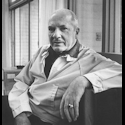Robert Heinlein
July 7, 1907 - May 8, 1988

The American author, Robert Heinlein, is best known for his works of Science Fiction. Even though his writing career began in pulp Science Fiction magazines, he was one of the first to be published in mainstream magazines such as the Saturday Evening Post.
Heinlein attended the United States Naval Academy and reached the rank of lieutenant before he was discharged due to illness. He had a few other short-lived jobs before becoming actively involved in politics. Heinlein's early experiences in the military and politics played a formative role in his writing.
Heinlein started writing in order to pay off his mortgage and published his first short story, Life-Line, in a pulp magazine. Heinlein went on to write many short stories and novels including four series: Future History, Lazarus Long, Heinlein juveniles, and World as Myth. Heinlein was considered to be the leader in a new type of Science Fiction, "Social Science Fiction," which was wrought with radical social criticism. He addressed various social themes in his writing including politics, religion, race, sex, philosophy, free expression of emotional and physical love, individualism, libertarianism, and unorthodox family structures.
Heinlein won multiple Hugo awards and was the first to win the Grand Master Award for lifetime achievement from the Science Fiction Writers of America. He coined the terms "grok," "waldo," and "moonbat" and popularized "TANSTAAFL" (There Ain't No Such Thing As A Free Lunch). Heinlein truly deserves his place as a Master of Science Fiction.
See bibliography: Robert Heinlein